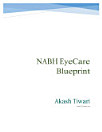NABH – Common Critical Non-Conformities in Indian Hospitals
About this ebook
Newly introduced standards include Promotive & Preventive Health, which expands hospitals’ focus to wellness education and disease prevention, and Sustainability in Healthcare, obliging hospitals to adopt eco-friendly practices like robust waste management and energy conservation. These new areas demand significant investment in policy-making, training, and infrastructure, presenting particular challenges since most hospitals lack existing frameworks in these domains1.
Critical updates strengthen demands for transfusion, obstetric services, hospital security, and cybersecurity, requiring alignment with Ministry of Health and international benchmarks. The renaming of “Hospital Infection Control” to “Infection Prevention & Control” underlines a proactive strategy against healthcare-associated infections (HAIs)1.
Historical NABH audits reveal that documentation errors account for about 70% of non-conformities, underscoring a deep, ongoing compliance problem. Common non-conformity areas, prioritized by impact and frequency, include:
Information Management System (IMS): Persistent documentation lapses and digital health/cybersecurity deficiencies. Non-compliance can compromise patient safety, data privacy, and organizational reputation due to legal risks or regulatory penalties. Solutions include standardized digital protocols, robust EHR adoption, and continuous staff training1.
Human Resource Management (HRM): Insufficient staff training, high attrition, clinician inertia, and credentialing gaps limit care quality and safety. Addressing this requires competency-based training, strong leadership support, and strict credentialing processes1.
Facility Management & Safety (FMS): Infrastructure neglect, emergency unpreparedness, and poor biomedical waste handling threaten patient and staff safety. Regular audits, mandatory drills, and systematic maintenance are crucial remedies1.
Infection Prevention & Control (IPC): Inconsistent adherence to hygiene, sterilization, and waste segregation fosters HAIs and antimicrobial resistance. Enforced protocols and continuous training are essential for safety and quality1.
Care of Patients (COP): Non-adherence to clinical/nursing protocols and safe procedure lapses continue to risk patient well-being. Implementing evidence-based SOPs, rigorous audits, and regular competency assessments is critical1.
Access, Assessment and Continuity of Care (AAC): Workflow problems—especially delayed or missing assessments and unclear transfer protocols—lead to treatment delays and patient dissatisfaction. Standardized forms and robust handover mechanisms can mitigate these issues1.
Patient Rights & Education (PRE): Failures in patient education, consent, and feedback collection erode trust and generate compliance lapses. Hospitals must ensure multilingual rights display, robust informed consent, grievance redressal, and privacy protection1.
Structural issues—such as weak quality culture, resource constraints, inadequate training, and outdated SOPs—undermine compliance initiatives. NABH 6th Edition sets higher standards for patient care, digital adoption, and ecological responsibility. Hospitals must establish robust documentation, continuous training, and leadership-driven quality improvement as ongoing priorities to achieve and sustain accreditation1.
About the author
Akash Tiwari (PGDM - IIM, Indore, MBA- Operations & HR, BSc - Nursing, LLB, AI in Healthcare- Stanford) is a seasoned healthcare leader with over 20 years of expertise in Quality, Operations, Nursing and service excellence. An IIM Indore alumnus, he has led Apollo Hospitals, Ahmedabad, to achieve JCI accreditation three times with zero non-conformities and audited 35+ hospitals for JCI/NABH compliance. Currently, as Corporate Head of Operations Process Excellence at Dr. Agarwal's Eye Hospital, Akash drives operational efficiency and innovation, including AI integration and process optimization. With roles like CEO of Siddhi Vinayak Hospital and Group Head of Quality at Shalby Limited, he combines strategic leadership with a passion for education, teaching healthcare management at Ahmedabad Management Association. Connect with Akash to explore healthcare transformation collaborations.







